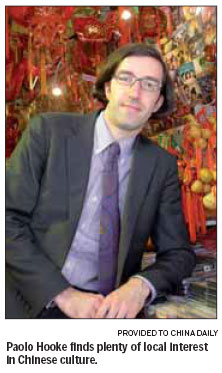Chinese classics are music to his ears
Updated: 2013-03-25 11:27
By Mark Ray in Sydney (China Daily)
|
||||||||

Sydney has always had a large and active Chinese community, but in the past few years that presence has taken a major leap forward.
There are about 4.6 million people in greater Sydney and half a million are ethnic Chinese. That's one in nine.
Over the past 15 years, those local Chinese have turned the city's Spring Festival celebrations into a major cultural event, which now attracts 40,000 ethnic Chinese from various parts of South East Asia, and plenty of locals from all ethnic backgrounds as well.
There are now more Chinese tourists visiting Australia each year than people from any other nation, with the exception of neighbor New Zealand.
One person who has seen this huge increase in the Chinese presence here is journalism graduate Paolo Hooke.
Hooke works in Sydney as a public servant in the NSW Department of Premier and Cabinet and once a month, as a volunteer, presents a radio show that features classical Chinese music.
Hooke's personal interest in China reflects the growing interest in Chinese things that is spreading across Australia. His curiosity was sparked during his undergraduate days at Sydney University when visiting Chinese students opened his eyes.
"I enjoy the evocative and exotic sounds of Chinese traditional instruments, particularly the erhu, pipa, yangqin and suona. "I especially like the blending of Chinese traditional instruments with Western instruments and the unique sounds that this creates."
Hooke has written magazine articles about this music and through his radio show has helped to promote various concerts in Sydney performed by visiting Chinese musicians.
He presents his show, Chinese Mosaic + Postcards from Shanghai, on Fine Music 102.5 radio station in Sydney on the first Saturday of every month.
The program is a mix of different Chinese music and incorporates material specially provided by Shanghai East Radio, as part of the cultural exchange between the two radio stations.
Hooke says the Chinese music scene in Sydney is thriving, thanks to talented musicians of Chinese background who live and work in the city and to visits by China-based musicians.
He has also presented two live-to-air recitals of Chinese music on his program to further cultural understanding between Australia and China.
"Australians are becoming increasingly interested in China and Chinese culture," he says. "Witness the growth of the Sydney Chinese New Year Festival. Over 17 years it has grown from a small community event in Chinatown attended by a few hundred people to become one of the world's biggest celebrations of the Lunar New Year (outside China)."
One highlight from those years, Hooke says, was the concert given in 2011 by Chinese pipa virtuoso Wu Man at the University of Sydney's Great Hall, an imposing 19th-century Victorian Gothic building used for major ceremonies and concerts.
Hooke cites one reviewer's reaction: "Wu's skill with such an unusual instrument has left the Great Hall in awe, but the experience has been all the more enjoyable because it is so quintessentially Sydney. After all, where else but in Sydney could you listen to an ancient Chinese instrument under stained glass windows of English kings while the cicadas chorus outside?"
That sounds like a perfect example of Chinese culture with Australian characteristics, a trend that will continue to flourish.
Recently, the Art Gallery of NSW, Sydney's oldest, largest and most prestigious gallery, announced plans for a major expansion that would double its exhibition floor space.
In a list of 12 "major points" about the project, that included such big-ticket items as the building of a new train station and a new ferry terminal to service the revamped gallery, were three telling words: "attract Chinese tourists".
For China Daily

 In Photos: 7.0-magnitude quake hits Sichuan
In Photos: 7.0-magnitude quake hits Sichuan
 Li Na on Time cover, makes influential 100 list
Li Na on Time cover, makes influential 100 list
 FBI releases photos of 2 Boston bombings suspects
FBI releases photos of 2 Boston bombings suspects
 World's wackiest hairstyles
World's wackiest hairstyles
 Sandstorms strike Northwest China
Sandstorms strike Northwest China
 Never-seen photos of Madonna on display
Never-seen photos of Madonna on display
 H7N9 outbreak linked to waterfowl migration
H7N9 outbreak linked to waterfowl migration
 Dozens feared dead in Texas plant blast
Dozens feared dead in Texas plant blast
Most Viewed
Editor's Picks

|

|

|

|

|

|
Today's Top News
Live report: 7.0-magnitude quake hits Sichuan, heavy casualties feared
Boston suspect cornered on boat
Cross-talk artist helps to spread the word
'Green' awareness levels drop in Beijing
Palace Museum spruces up
First couple on Time's list of most influential
H7N9 flu transmission studied
Trading channels 'need to broaden'
US Weekly

|

|







